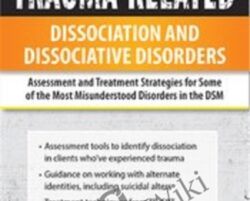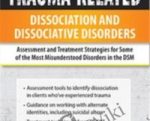You work with trauma to make a difference.But developmental trauma and disorganized attachment have profoundly negative effects on those who experience them — and the signs and symptoms of dissociation can be difficult to recognize, even for clinicians.And many people with trauma-related dissociation and dissociative disorders actively work to hide their struggles; stigma and shame driving their secrecy and barring them from sharing the full extent of their distress with you. Frightened and confused, many become “revolving door” patients, in and out of the mental health system when the root of their problems can’t be identified.They are in desperate need of your help.This recording will prepare you to effectively meet the clinical challenges involved in identifying and treating individuals across the dissociative spectrum.Key Benefits:Specialized methods for assessing clients with severe trauma who may be dissociating.Maximize attunement with dissociated clients while maintaining therapeutic boundaries.Step-by-step processes that effectively create and sustain an atmosphere of trust and safety.Detailed guidance on therapeutic interventions to calm and ground dissociative clients.Skills to help you prevent and manage suicidal crises.Treatment techniques from Trauma Focused CBT, EMDR and somatic approaches.Don’t miss out on this chance to add valuable skills and tools to your trauma practice and ensure those seeking your help don’t become “revolving door” patients.Purchase this recording today and provide hope and healing to those with trauma-related dissociation and Dissociative Disorders!Establish how the relationship between developmental trauma and dissociation can inform clinical assessment and diagnosis of dissociative disorders.Articulate how the clinician can reduce the possibility of countertransference by regulating their reactions in-session.Design treatment plans that ground dissociative clients with relaxation techniques and mindfulness.Examine the clinical implications of suicidal alters and connect this information to techniques that can help prevent and manage suicidal crises in severely dissociated clients.Develop strategies for integrating support systems into the lives of clients with Dissociative Identity Disorder, and communicate how this approach can improve treatment outcomes.Formulate treatment plans for trauma that are individualized to clients with dissociative disordersGet Trauma-Related Dissociation and Dissociative Disorders: Assessment and Treatment Strategies for Some of the Most Misunderstood Disorders in the DSM of author Greg Nooney only price 79$Developmental Trauma, Symptomology and Risk FactorsThe role of early traumatic stress and insecure attachmentTypes of Dissociative Disorders and symptomologyDissociative Amnesia, Depersonalization Disorder,Dissociative Identity DisorderPopulations at risk for dissociative issuesThe controversy – misconceptions and false memoriesClinical Assessment Tools for Trauma and Dissociative DisordersAdult Attachment InterviewAdverse Childhood Experiences QuestionnaireDissociative Experiences ScaleIdentifying co-occurring disordersAvoiding false negatives and false positives in diagnosing DIDProblems and Solutions in the Treatment of People with Dissociative DisordersMaximize attunement with clients who are dissociatingGetting client buy inHow to establish trust and cooperationManage issues that can interfere in therapyCompassion fatigueModulating your own reactionsThe dangers of vicarious traumaIdentify and address implicit biasesMaintain therapeutic limits and boundariesEngagement of alternate identities in DIDTherapeutic Techniques that Develop Stability and Safety for Dissociating ClientsCalming practices to ground the dissociative clientConscious breathingRelaxation techniquesMindfulnessWorking with clients facing continued abuseTechniques to manage suicidal crises – account for the suicidal alterDon’t let “crises of the week” keep you from reaching treatment goalsBuild support systems with WRAP plans (Wellness Recovery Action Plan)Specific Trauma Work for Dissociative Disorder Treatment PlansDifferences in working with DID clientsThe role of resourcing in traumaCalm clients and create personal safety with TF-CBTEye Movement Desensitization and Reprocessing (EMDR)Somatic approaches – connect memory to the bodyLimitations of the Research and Potential Treatment RisksFeasibility of randomized prospective double-blind placebo-controlled studiesEthical, financial, and logistical constraintsTrauma, disorganized attachment and research dataPotential risks in treating trauma and Dissociative disordersGet Trauma-Related Dissociation and Dissociative Disorders: Assessment and Treatment Strategies for Some of the Most Misunderstood Disorders in the DSM of author Greg Nooney only price 79$Tag: Trauma-Related Dissociation and Dissociative Disorders: Assessment and Treatment Strategies for Some of the Most Misunderstood Disorders in the DSM – Greg Nooney Review. Trauma-Related Dissociation and Dissociative Disorders: Assessment and Treatment Strategies for Some of the Most Misunderstood Disorders in the DSM – Greg Nooney download. Trauma-Related Dissociation and Dissociative Disorders: Assessment and Treatment Strategies for Some of the Most Misunderstood Disorders in the DSM – Greg Nooney discount.
 NHB Workshop – Greg Nelson
₹3,154.00
NHB Workshop – Greg Nelson
₹3,154.00
 5 Year Monthly Real Estate Coaching Series – Greg Pinneo
₹22,410.00
5 Year Monthly Real Estate Coaching Series – Greg Pinneo
₹22,410.00
Trauma-Related Dissociation and Dissociative Disorders: Assessment and Treatment Strategies for Some of the Most Misunderstood Disorders in the DSM – Greg Nooney
₹12,450.00




